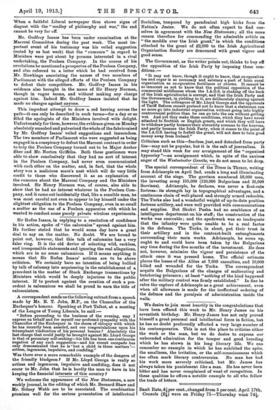The Government, as the writer points out, thinks to buy
off the opposition of the Irish Party by imposing these con- ditions :—
"It may not know, though it ought to know, that co-operative tea and sugar is as necessary and salutary a part of Irish rural organization as co-operative fertilisers or churns. It cannot be so innocont as not to know that the political opposition of the commercial middlemen whom the I.A.O.S. is shaking off the back of the Irish agriculturist is corrupt, and that the Irish Party and the Government, in yielding to it, are deliberately sinning against the light. The colleagues of Mr. Lloyd George and the opponents of Tariff Reform cannot pretend not to know that a statesman can no more go into industrial organization without going into highly controversial politics than he can go into the sea without getting wet. And yet they make these conditions, which they have never attached to Scottish or English grants, and which they will have to withdraw partly because their absurdity screams to the heavens, and partly because the Irish Party, when it comes to the point of the I.A.O.S. having to forfeit the grant, will not dare to turn good money away from Ireland?'
Criticism such as this—fearless, just, and detached from party lies—may not be popular, but it is the salt of journalism. It may stand this week for our arraignment of the "organized hypocrisy "—an arraignment which, in spite of the anxious anger of the Westminster Gazette, we do not mean to let drop.










































 Previous page
Previous page